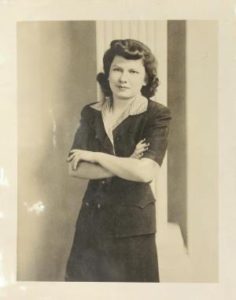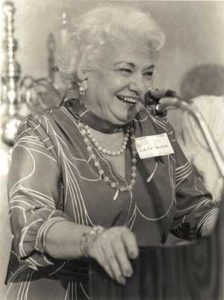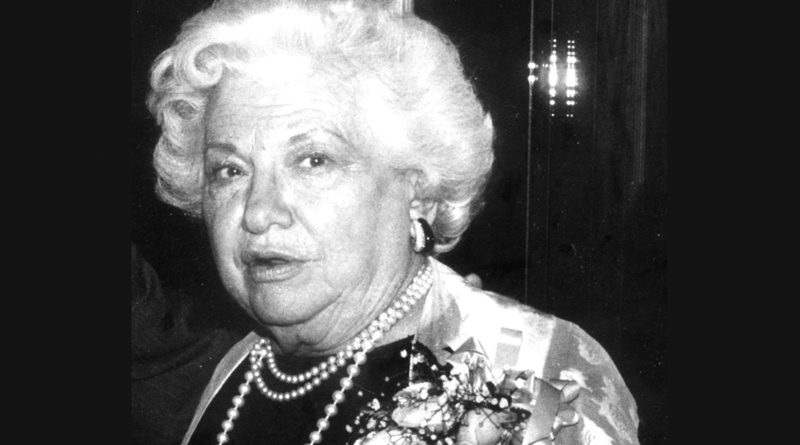Liz Carpenter: The ‘funniest woman in politics‘ was born in Salado
By Janna Zepp | Public domain photos
Salado can boast that it is the birthplace of many a famous Texan, including someone considered the “funniest woman in politics.”
Long before witty Texas journalist Molly Ivins came along, Liz Carpenter was entertaining the American public with her pithy writing and sharp intellect.

Writer, feminist, reporter, media adviser, speechwriter, political humorist and public relations expert Mary Elizabeth Sutherland Carpenter was the first woman executive assistant to Vice President Lyndon Baines Johnson from 1961 to 1963. She served as press secretary for First Lady Lady Bird Johnson from 1963 to 1969. She was a prominent member of the Johnson White House and a close personal friend.
An ardent supporter of the Women’s Movement when it began, Carpenter never wavered from her convictions. She backed everything from the Equal Rights Amendment to fighting cancer. Her lighthearted memoir of her time in the White House, Ruffles and Flourishes, published in 1969, was a national best-seller. Carpenter was in demand as a public speaker until her death on March 20, 2010.
Born Sept. 1, 1920, in her great-grandparents’ antebellum home in Salado, Carpenter spent her early years in the 24-room Robertson House. At the age of 7, she moved with her family to Austin. The house was declared a state historic monument in 1936 when she was 16. In 1967, a plaque was unveiled to indicate that Carpenter had once lived there. Another memorial to Carpenter is on the campus of Salado College, founded by her great-grandfather, Elijah Robertson.
Strong, adventurous women equal to the men fill Carpenter’s family tree. A great aunt, Louella Robertson Fulmore, fought for educational equality for women. Another great aunt, the prominent suffragist Birdie Johnson, became the first Democratic national committeewoman from Texas. Johnson encouraged women to organize to make their influence felt at the polls, declaring that it was “our first step” in the exercise of “direct political power.” Feminism showed strong in Carpenter’s DNA.
Carpenter knew the dark side of her ancestors, whose sterling reputations tarnished themselves with enslavement of others and support for secession. She never allowed her rich Texas legacy to develop in her a sense of privilege or birthright. Instead, it taught her that adversity could not stop ordinary people from achieving and accomplishing great things. It also instilled a love of Texas history and a respect for its historians telling truth to power. It might also have inspired her to lob some fantastic verbal grenades at politicians. When Democratic Texas Gov. John Connally threw his support behind Republican incumbent President Richard Nixon in the 1972 campaign and organized “Democrats for Nixon,” Liz quipped had Connally been at the Alamo, he would have formed “Texans for Santa Anna.”
Carpenter began her journalism career at Austin High School in Austin as the editor of the school paper, The Austin Maroon. There, she met the business manager and fellow aspiring journalist Leslie E. “Les” Carpenter. The two became best friends, majored in journalism at the University of Texas at Austin, and worked together on the university newspaper, The Daily Texan. Les firmly supported Liz when she was elected vice president of the student body, the first woman to have held that position.
In 1942, Carpenter began covering the White House and Congress for the Austin American-Statesman. For the next 18 years, she reported on presidents from Franklin D. Roosevelt to John F. Kennedy.
The Carpenters married on June 17, 1944, after Les’s discharge from the U.S. Navy during World War II. They launched the Carpenter News Bureau in the National Press Building in Washington, D.C. Until about 1960, Liz covered Congress and the White House for various Texas newspapers. She missed work only briefly when their two children, Scott and Christy, were born.

Liz Carpenter was in Dallas on Nov. 22, 1963, when Kennedy was assassinated. She drafted the 58 words Johnson used on his return to Washington:
“This is a sad time for all people. We have suffered a loss that cannot be weighed. For me, it is a deep personal tragedy. I know that the world shares the sorrow that Mrs. Kennedy and her family bear. I will do my best. That is all I can do. I ask for your help and God’s.”
Following Johnson’s succession to the presidency, Carpenter became the first professional newswoman to be press secretary to a first lady. She also served Lady Bird Johnson as staff director. Carpenter assembled several other staffers as an informal “White House Humor Group” to add humorous remarks to the president’s speeches, at Johnson’s request.
Carpenter was a vice president of Hill and Knowlton in Washington after leaving the White House. In 1971, she was one of the founders of the National Women’s Political Caucus and co-chair of ERAmerica, traveling the country to push for passage of the Equal Rights Amendment.
“Anybody against women, against the ERA, should never be voted into office again,” Carpenter said.
Respected by Republicans and Democrats alike, President Gerald Ford appointed Carpenter to the International Women’s Year Commission. President Jimmy Carter appointed her to serve as Assistant Secretary of Education for Public Affairs, and President Bill Clinton appointed her to serve on the White House Conference on Aging. She was a member of the Peabody Awards Board of Jurors from 1977 to 1983.
“I learned in my four decades in Washington that one person can make a difference,” Carpenter said.
In 1974, Les Carpenter died suddenly of a heart attack at the age of 52, just a year after the death of Lyndon Johnson. In 1976, Carpenter returned to Austin.
“Family roots, the love for Texas and the University of Texas and the LBJ Library brought me back home,” she said. She purchased a house she called Grass Roots in the West Lake Hills overlooking the Austin skyline and the Colorado River.
The Red Hat Society owes its foundation to Carpenter. She wrote a story for Reader’s Digest in the early 1980s, about enjoying life having recovered from an illness, closing the article with the poem Warning by British poet Jenny Joseph, which had the opening lines “When I am an old woman I shall wear purple, With a red hat which doesn’t go, and doesn’t suit me.” This led to the poem’s fame spreading across the U.S., through adoption by the greeting card industry and the society’s development.
“A major advantage of age is learning to accept people without passing judgment,” she remarked.

Carpenter was named a distinguished alumna of the University of Texas in 1975, and in 1990 was named distinguished alumnae of the Department of Communications. She was given the ProBene Award of the College of Liberal Arts. She was the recipient of Alpha Phi’s Frances E. Willard Award in 1980. Gov. Mark White nominated her to the Texas Women’s Hall of Fame.
In 1984, a group of her friends, including Erma Bombeck and Mark Russell, established The Liz Carpenter Lectureship. Bombeck and Russell gave a performance at the Paramount Theater to raise funds for it. Since that time, Carpenter’s lectureship in the College of Liberal Arts brought appearances by President Bill Clinton, President Gerald Ford, Hillary Clinton, Jehan Sadat, Maya Angelou, Bill Moyers, Jane Goodall, writers such as Betty Friedan, Nora Ephron, Shana Alexander and Jean Auel, and nationally known humorists such as Fannie Flagg and Carol Channing.
The Liz Carpenter Award is given annually for the best scholarly book on the history of women and Texas published during the year. The award was established in 1992 by an anonymous donor. It honors Carpenter, a sixth-generation Texan, for her commitment to the pursuit of the history of women in Texas and for a lifetime of achievements that qualify her as a maker of that history.
“Instead of looking at life as a narrowing funnel, we can see it ever widening to choose the things we want to do, to take the wisdom we’ve learned and create something,” Carpenter said.
In her words
Books by Liz Carpenter include Unplanned Parenthood, Random House 1994; Getting Better All the Time, Simon and Schuster 1986. Start With a Laugh, gives humorous advice on speech writing, was published by Eakin Press and launched at the opening of the National Women’s Museum: An Institute for the Future in Dallas. Her most recent book, Presidential Humor, Bright Sky Press 2006, was a compilation of quips and quotes from “George the First to George the Worst.”




